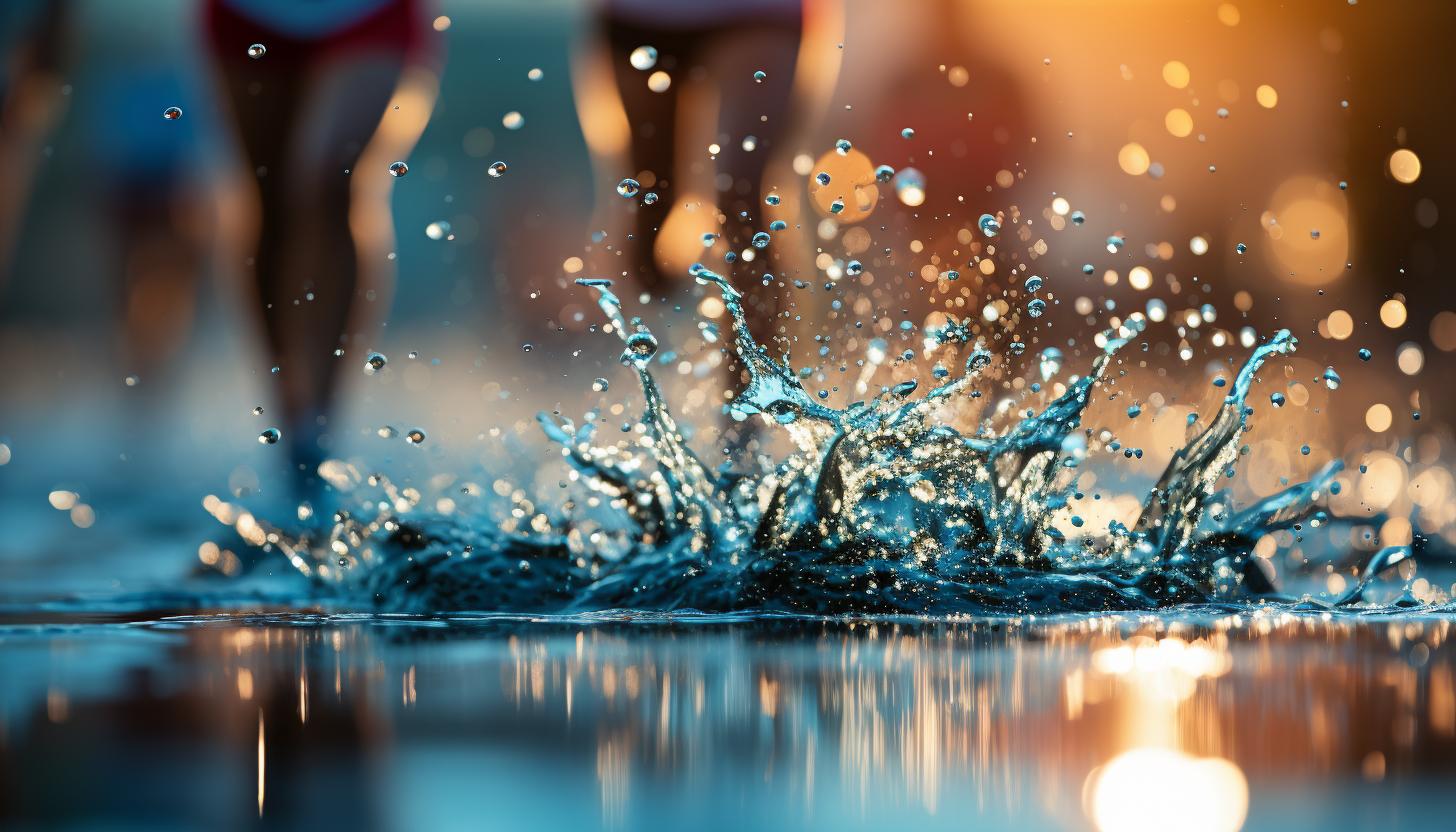Hydration 101: How Much Water Do Runners Really Need

Imagine yourself running on a scorching hot day, sweat pouring down your face as you push through each step. Your body craves hydration, but how much water do you really need?
In this article, we dive into the world of hydration for runners, exploring the importance of staying hydrated and the factors that affect your water needs. Discover recommended daily intake and strategies to keep yourself hydrated during those long runs.
Don’t let dehydration slow you down – learn how to quench your thirst like a pro!
The Importance of Hydration for Runners

Hydration is crucial for runners because it helps maintain performance and prevent dehydration. Proper hydration strategies are essential to ensure that your body has enough water to support optimal functioning during exercise. When you’re well-hydrated, your muscles can work more efficiently, reducing the risk of fatigue and cramps. Additionally, staying properly hydrated helps regulate your body temperature, which is important for endurance athletes like runners.
One of the key benefits of proper hydration is improved performance. Studies have shown that even mild dehydration can negatively impact athletic performance by impairing cognitive function and increasing perceived exertion. By maintaining adequate fluid intake before, during, and after a run, you can enhance your stamina and overall running experience.
To stay adequately hydrated while running, make sure to drink fluids before heading out on your run to start off well-hydrated. During longer runs or hot weather conditions, it’s important to replenish lost fluids by sipping water or sports drinks regularly throughout your run. After finishing your run, continue hydrating by drinking water or electrolyte-rich beverages.
Now that we understand the benefits of proper hydration for runners, let’s explore the factors that affect water needs in running.
Factors Affecting Water Needs in Running

When you’re running, factors like temperature, intensity, and duration can greatly impact how much fluid your body requires. Proper hydration is crucial for optimal performance and avoiding the negative effects of dehydration. Here are three factors that can affect your water needs while running:
1. Temperature: Running in hot weather increases sweat production and can lead to rapid fluid loss. It’s important to drink more water before, during, and after your run to replace lost fluids.
2. Intensity: Higher-intensity workouts cause you to sweat more profusely, increasing the need for adequate hydration. Pushing yourself during a tough workout without replenishing fluids can lead to decreased performance and increased fatigue.
3. Duration: Longer runs require more hydration as your body loses fluids over an extended period of time. It’s essential to have a steady intake of water or sports drinks throughout longer runs to maintain proper hydration levels.
Understanding these factors affecting performance and the effects of dehydration will help you determine how much water you should be drinking while running. In the next section, we will discuss the recommended daily water intake for runners and practical tips on staying properly hydrated during training sessions and races.
Recommended Daily Water Intake for Runners

Understanding the factors that impact your water needs while running can help determine the amount of fluid you should be consuming on a daily basis. Optimal hydration is crucial for runners as it helps maintain performance, prevent dehydration, and promote overall health. The benefits of proper hydration include improved endurance, better cardiovascular function, and enhanced recovery.
So how much water do you really need? The answer depends on several factors such as your body weight, duration and intensity of exercise, environmental conditions, and sweat rate. A general guideline is to aim for 16-20 ounces of fluid two hours before your run, 6-12 ounces every 15-20 minutes during exercise, and another 16-24 ounces after completing your run.
To make it easier for you to understand your daily water intake requirements as a runner, here is a table that outlines approximate fluid recommendations based on body weight:
| Body Weight (lbs) | Daily Fluid Intake (ounces) |
|---|---|
| 100 | 50 – 75 |
| 150 | 75 – 112 |
| 200 | 100 -150 |
| 250 | 125 -187 |
| 300 | 150 -225 |
Remember that these are just rough estimates and individual needs may vary. It’s important to listen to your body’s signals and adjust accordingly. Stay hydrated and reap the benefits of proper hydration in your running journey!
Strategies for Staying Hydrated During a Run

To stay properly fueled during your run, it’s important to find strategies that work for you and help maintain your energy levels. Here are three key strategies for staying hydrated during your runs:
1. Pre-run hydration: Before heading out for a run, make sure you are adequately hydrated. Drink 16-20 ounces of water or a sports drink about two hours before your run to ensure proper hydration levels.
2. Electrolyte replacement during running: As you sweat, you lose electrolytes such as sodium and potassium, which are essential for maintaining fluid balance in the body. To replenish these electrolytes, consider consuming a sports drink or taking electrolyte supplements during longer runs (over an hour) or particularly intense workouts.
3. Hydration on the go: Carry a water bottle or use hydration belts or backpacks with built-in water reservoirs to easily access fluids while running. Aim to drink about 4-8 ounces of fluid every 20 minutes during your run to prevent dehydration.
By implementing these strategies, you can ensure that you stay properly hydrated throughout your runs and maintain optimal performance.
Now let’s explore the signs and risks of dehydration in runners…
Signs and Risks of Dehydration in Runners

Dehydration can lead to various symptoms such as fatigue, dizziness, and decreased performance during runs. It’s important to be aware of the signs and risks of dehydration in runners so that you can take appropriate measures to prevent it.
One common symptom of dehydration is increased thirst. If you find yourself feeling thirsty during your runs, it may be a sign that you need to hydrate more frequently. Another common symptom is dark-colored urine or infrequent urination. This indicates that your body is not getting enough fluids and is trying to conserve water. Other symptoms include dry mouth, headache, muscle cramps, and lightheadedness.
Dehydration can pose serious risks for runners, including heat exhaustion and heat stroke. These conditions occur when your body loses too much fluid and electrolytes through sweating without proper replenishment.
To prevent dehydration during runs, there are a few techniques you can employ. First and foremost, make sure to drink plenty of fluids before, during, and after your run. Aim for 16-20 ounces of water two hours before your run and then another 8-10 ounces every 15-20 minutes while running. Additionally, consider drinking sports drinks or consuming snacks with sodium to help replace the electrolytes lost through sweat.
Conclusion
In conclusion, staying properly hydrated is crucial for runners to perform at their best and avoid dehydration risks.
Remember, ‘you can lead a horse to water, but you can’t make it drink.’ Similarly, while it’s essential to provide yourself with the necessary hydration knowledge and strategies, ultimately, it’s up to you to take action and prioritize your water intake.
By understanding the factors affecting your water needs and implementing practical hydration strategies during your runs, you’ll be able to stay hydrated and improve your running performance.






